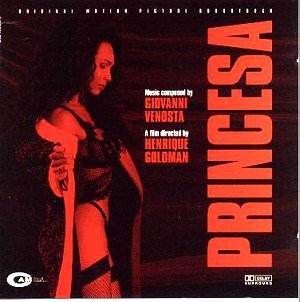Giovanni VENOSTA
Princesa
 OST
OST
 CAM 499928-2
(39:01)
CAM 499928-2
(39:01)
CAM
Original Soundtracks

It fascinates me how Italian film music has such a distinctive sound and
sensibility, right through from the masterful Morricone to glorious Goblin.
And let me make one thing very clear, I'm a huge fan of this 'Italiana' style
but when I read the sleeve notes of Princessa, informing me that the
story concerned a young Brazilian transvestite who arrives in Italy to undergo
a sex change operation, I found it hard to imagine how that premise could
inspire music of any great note. And in this particular instance, I was
absolutely right.
The opening cue 'Ela Sonha' has a soft, wordless vocal by Laura Pone, before
a laid-back trumpet solo takes centre stage and the title track itself is
also in similar vein, again featuring the work of Laura Pone, this time with
melancholy strings and some easy-going jazzy elements. These two pieces are
then reprised in various other forms; 'Ela Sonha' has the same title but
with tinkling keyboard and minus the vocals, then there's another 'Princessa',
also sans vocal and this central theme is later heard on 'The Finger' in
a string variation with some underlying unease, accompanied by increasingly
heavy drum work. It also gets an organ treatment at the beginning of 'Fernando',
although the track soon degenerates into a barrage of bizarre sound effects.
Unfortunately none of these interpretations are very appealing.
But worse is yet to come. 'Santarosa' is a kind of Latino pseudo disco number
with eccentric vocal effects and is quite frankly abysmal. 'Ela Escuta' is
slightly better (which isn't saying much!), a soft pop number with vocal
backing and a saxophone lead. Also included is 'Estate' written by Messrs.
Brighetti and Martino, with a female vocal performed by Auwe in a light,
forgettable, typically continental song, the kind of thing you might have
heard on a 60s soundtrack as night club background music. Finally, as if
to rub salt well and truly into the wound, 'Santarosa' is reprised, apparently
to remind us just how utterly awful it really is.
There is often a kind of timelessness about Italian film music. And the
'Princessa' theme could, with only the smallest of variation in the
instrumentation, have easily been composed anytime from the 1960s onward.
And in many ways I find that to be an endearing quality. Sadly though, even
taking this into consideration, the music on offer here is so unremarkable
at its best and damn right dreadful at its worst, that I find I'm struggling
to really say anything positive about it at all. In fact, the more I consider
it, the more I'm forced to conclude that very, very few will get anything
out of this soundtrack. Apart from the vaguely likeable title theme, the
rest of the CD is so utterly devoid of anything remotely pleasing, it really
is quite startling.
Mark Hockley

![]()
![]()
![]()
![]()
![]()
![]()
![]()
![]()
![]()
![]()
![]()
![]()
![]()
![]()
![]()
![]()